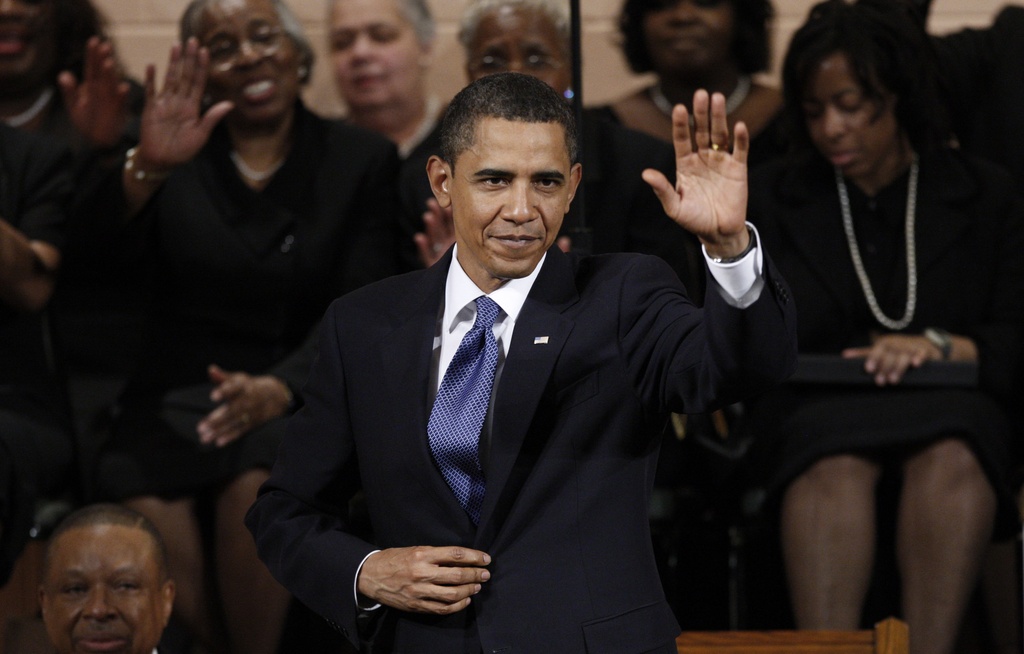
Obama discovers the flip side of change

Barack Obama was inaugurated as president of the United States on January 20, 2009, on an unprecedented wave of popular euphoria.
One year on, the senator from Illinois has seen his popularity sink, notably among those who elevated him to power: floating voters, “progressive” Democrats and blacks. Three Americans with Swiss origins who voted for him give their point of view.
Public anxiety over the financial crisis, double-digit US unemployment, healthcare reform and the war in Afghanistan have pushed Obama’s approval ratings down to 46 per cent, compared with 70 per cent when he took office.
In fact a quarter of pro-Obama Democrats think he has failed to deliver the much-heralded and much-promised change.
“Obama has got problems,” according to Alfred Defago, the former Swiss ambassador to Washington, who, having dual nationality, was able to vote for Obama.
“The first year of his mandate has seen mixed results inasmuch as not one of his main goals has yet been accomplished,” said Defago, currently a professor at Wisconsin University.
On Tuesday a stinging loss in Massachusetts cost Obama the 60-vote Senate supermajority he was counting on to overcome Republican procedural obstacles and pass far-reaching healthcare legislation.
The outcome splintered the rank and file on how to salvage the bill, energised congressional Republicans and left Obama and the Democrats with fallback options that range from bad to worse.
“Really positive”
But for Vinz Koller, president of California’s Monterey County Democrats, Obama’s first year in the White House has been “really positive”.
“He inherited a terrible situation but has nevertheless achieved remarkable things seeing that he has pulled the country out of the abyss regarding the economy,” said Koller, also a dual national.
But even though he says he is “still very enthusiastic”, he clearly has reservations.
“Obama isn’t where we’d like him to be at this stage of his presidency,” he admits.
“I’d like unemployment to be lower, I’d like Iraq and Afghanistan to be calm enough for him to be able to withdraw troops. Personally, I would have preferred the introduction of a universal and public healthcare system, but I also know that the expectations on the left of the Democratic Party were unrealistic.”
He adds that in his constituency he hears “more criticism and dissatisfaction from people on the left of the Democratic Party than from Republicans who voted for Obama”.
“Very frustrated”
John Hooker, a former marketing consultant in the health sector who divides his time between New York and Switzerland, admits that many of his “progressive friends” are “very frustrated”.
“They think Obama should be more authoritarian and they are disappointed, above all on the contents of the health reform,” he said.
Asked whether he himself is disappointed by Obama, Hooker sighs and pauses.
“I’m not that disappointed, as I wasn’t under any illusions. I’m more disappointed by the United States. The system isn’t working. There’s too much money. It’s corrupting everything and nothing’s changing,” he said.
“Obama is very conciliatory – perhaps too much so. I wouldn’t be so hard on him – I’d say that I’m still waiting,” said Hooker, who donated to Obama’s presidential campaign and who still contributes to the Democratic Party.
Too great expectations
The drop in Obama’s approval ratings in the United States is inevitable. The exercise of power always erodes the fever that accompanies the campaign and the inauguration.
But in Obama’s case the erosion has been so pronounced that, apart from Ronald Reagan, he is the most unpopular president at the beginning of his second year of office since 1945.
“The expectations surrounding Obama during the presidential campaign were much too great and he’s been painted as a sort of messiah. He’s paying for that now,” Defago said.
“And on top of that his programme isn’t suitable at the moment. 2009 really wasn’t the year to launch a health reform, when people wanted him to concentrate on the recession.”
Marie-Christine Bonzom in Washington, swissinfo.ch (Translated from French by Thomas Stephens)
The majority of Americans can’t see any of the change promised by Barack Obama when he was running for president.
Only 37% of Americans think their country is going in the right direction – 13 percentage points fewer than eight months ago.
49% of independent voters disapprove of Obama’s action. This is the lowest level for decades among independent voters for a president at this stage in his mandate.
Recently black members of Congress held a media conference to deplore the lack of action Obama was taking concerning problems affecting the black community, particularly unemployment.
While more than 90% of black voters voted for Obama, 40% now think their situation hasn’t changed. 12% think it has got worse.

In compliance with the JTI standards
More: SWI swissinfo.ch certified by the Journalism Trust Initiative















![The four-metre-long painting "Sonntag der Bergbauern" [Sunday of the Mountain Farmers, 1923-24/26] had to be removed by a crane from the German Chancellery in Berlin for the exhibition in Bern.](https://www.swissinfo.ch/content/wp-content/uploads/sites/13/2025/12/01_Pressebild_KirchnerxKirchner.jpg?ver=f05a5a9c)















You can find an overview of ongoing debates with our journalists here . Please join us!
If you want to start a conversation about a topic raised in this article or want to report factual errors, email us at english@swissinfo.ch.